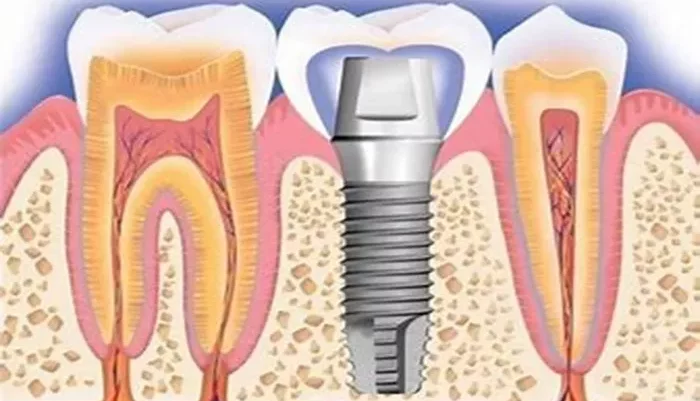Dental implants are a reliable and durable solution for replacing missing teeth. They consist of several components, including the implant itself, the abutment, and the crown. The crown, which sits atop the abutment, is the visible part of the implant that resembles a natural tooth. Despite their robustness, crowns can occasionally fall out due to various factors. This article aims to provide a comprehensive guide on what to do if the crown of a dental implant falls out, offering insights from a professional dentist’s perspective.
Understanding the Components of Dental Implants
Before delving into the steps to take if the crown falls out, it’s essential to understand the structure of dental implants. Dental implants are artificial devices designed to replace missing teeth. They are typically made of titanium, a biocompatible material that integrates well with bone tissue. The implant itself is a small post that is surgically inserted into the jawbone. Over time, the bone tissue fuses with the implant through a process called osseointegration, creating a stable foundation for the replacement tooth.
The abutment is the next component. It is a small connector piece that attaches to the top of the implant and serves as a platform for the crown. The crown, which is the visible part of the implant, is a custom-made restoration designed to match the color, shape, and size of the surrounding teeth.
Reasons Why the Crown Might Fall Out
There are several reasons why the crown of a dental implant might fall out. Some of the most common include:
Cement Failure: The crown may be cemented onto the abutment. Over time, the cement can wear down or degrade, leading to the crown becoming loose and eventually falling out.
Screw Loosening: In some cases, the crown may be attached to the abutment using a screw. If the screw becomes loose, the crown can detach and fall out.
Excessive Force: Exposing the implant to excessive force, such as chewing on hard objects or grinding teeth, can cause the crown to become loose or break.
Bone Loss: If the jawbone around the implant deteriorates, it can weaken the support structure for the crown, causing it to become unstable.
Steps to Take If the Crown Falls Out
If the crown of a dental implant falls out, it’s important to take prompt action to protect the implant and prevent further damage. Here are the steps to follow:
Retrieve the Crown: Carefully pick up the fallen crown and handle it gently. Avoid bending or damaging it as it may still be repairable. If possible, place the crown in a safe, clean container with a bit of water or saliva to keep it moist.
Contact Your Dentist: As soon as possible, contact your dentist to schedule an appointment. Explain the situation and ask for advice on how to care for the implant and crown in the meantime.
Avoid Using the Implant: In the meantime, avoid using the implant for chewing or biting. This will prevent further damage to the abutment and surrounding teeth.
Temporary Solutions: Depending on the severity of the situation, your dentist may recommend a temporary solution to protect the implant. This could include using a dental adhesive to temporarily reattach the crown or providing a temporary crown.
Professional Evaluation and Treatment
During your appointment, your dentist will conduct a thorough evaluation of the implant and crown. They will assess the cause of the crown’s detachment and determine the best course of treatment. Here are some potential outcomes:
Recementing the Crown: If the crown is still intact and in good condition, your dentist may recement it onto the abutment. They will use a strong, durable cement to ensure a secure fit.
Replacing the Crown: If the crown is damaged or worn, your dentist may recommend replacing it with a new one. They will take impressions of your teeth and create a custom-made crown to match your surrounding teeth.
Adjusting the Abutment: In some cases, the abutment may need to be adjusted to better support the crown. Your dentist may reshape or modify the abutment to ensure a better fit and stability.
Addressing Bone Loss: If bone loss is the underlying issue, your dentist may recommend additional treatments, such as bone grafting, to strengthen the jawbone and provide better support for the implant.
Checking the Screw: If the crown was attached using a screw, your dentist will check to ensure that it is tight and secure. If the screw is loose, they will tighten it to prevent future detachment.
Preventive Measures to Avoid Future Issues
To prevent future issues with the crown of your dental implant, it’s important to follow some preventive measures:
Regular Dental Check-ups: Schedule regular dental check-ups to monitor the health and stability of your implants. Your dentist will check for signs of wear, loosening, or damage and provide necessary adjustments or repairs.
Good Oral Hygiene: Maintain good oral hygiene practices, including brushing and flossing regularly. This will help keep the implant and surrounding teeth clean and free from plaque and tartar.
Avoid Hard Foods: Avoid chewing on hard foods or objects that could damage the crown or implant.
Use a Nightguard: If you grind your teeth at night, consider using a nightguard to protect your implants and teeth from excessive wear.
Conclusion
The crown of a dental implant is a vital component that provides the final restoration and aesthetic appeal of the implant. If the crown falls out, it’s important to take prompt action to protect the implant and prevent further damage. By understanding the causes of crown detachment and following the recommended steps, you can ensure that your dental implant remains healthy, stable, and functional. Regular dental check-ups and preventive measures will also help maintain the long-term success of your dental implants.
Related topics:

